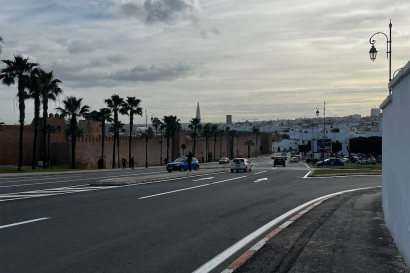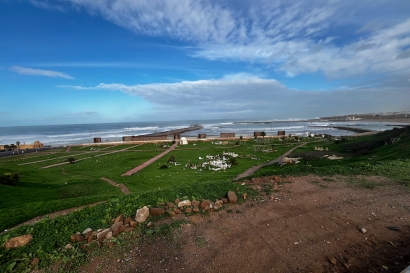Over the Thanksgiving Holiday, my friends and I traveled to Madrid to eat our way through the city and explore the plethora of museums, plazas, restaurants, stores, and parks. We paid 40 euros (can you believe it? Ryanair.com has the best flights) for a two-way ticket from Rabat, and booked an Airbnb in the Sol neighborhood for 71 dollars per person for three nights. Since I traveled to Tangier and Fez for our Fall break, it was refreshing to shake up my routine after spending so much time in Morocco; therefore, our trip to Madrid was timely and very much appreciated. Yet even though I had travelled to Spain before, I observed a few phenomena in Madrid that surprised me after living in Rabat for a few months.
La idioma: A semi-mono-lingual experience
Among other hispanophone countries, Spain is one of many with a singular national language and prides itself in Castilian Spanish and culture. The linguistic landscape of Madrid was full of advertisements, street signs, subway directions, and restaurant signage in Spanish. The residents around us spoke Spanish and everyday interactions were conducted in Spanish (as expected); however, as a linguist-in-training, I found it interesting that almost everyone knew some form of English as a second language, and often reverted to English when speaking with my friends. In Morocco, I am accustomed to residents speaking a whirlwind of languages including Arabic, Tamazight, French, English, and the occasional bit of Spanish, and residents often revert to French when I fail to understand their Arabic. Yet in Madrid, residents seemed to live between a Spanish-English binary that was prevalent everywhere we went.
La secularidad: The absence of religion
As many may know, Spain is proud of its rich Catholic heritage. Around 70% of Spaniards identify with the Catholic faith, and we visited some of the most breathtaking cathedrals as a testament to the history of Catholicism as a Spanish institution. Yet when shopping in Plaza del Sol or experiencing nightlife in Madrid, you would never know that Catholicism played a foundational role of the construction of the Spanish state and society.
In Morocco, it is difficult to walk around and not witness Islam in everyday life. The Call to Prayer, the absence of pork on restaurant menus, the colloquialisms “Inch’allah” (meaning “God willing”) and “Alhamdulillah” (meaning “Praise be to God”), and women in the medina - the vast majority of whom are veiled - serve as daily reminders of Islam as central to Moroccan society. It was fascinating to travel Spain and experience such a secular culture after having been in Rabat, noticing that aside from the occasional clang of church bells, Catholicism was largely absent from mainstream Spanish society.
El desarrollo: Development in the east and west
My most important observation lies in noticing changes in infrastructure that affected the manner in which Spanish society functioned. Much like cities in the United States, I think that Madrid was so fast-paced and the people looked healthy because it was equipped with new subway systems, comprehensive healthcare and sanitation systems, integrated technology in purchasing goods, an higher level of average income per household, and reformed education systems that produced knowledgeable students. According to the United Nations, the Moroccan economy is classified as “developing” and I believe that it does not operate at the same level because it does not enjoy the same luxuries that are prevalent in Spain or other parts of the “western” world. For example, other students and I frequently expressed concern at the number of blind and deaf individuals in Morocco, in addition to those missing limbs, suffering from gangrene or burns, or those with extensive tooth decay and/or gum disease. Even though Rabat is in the process of modernizing with updated train stations and new construction projects, it is evident that more progress awaits on the horizon, especially regarding the health and wellbeing of its residents.
As a foreigner to both Morocco and Spain, it was also fascinating to transition between traditionally “eastern” and “western” cultures and to observe the differences in consumption and individualism. Spanish restaurants, tech stores, and shops were filled to the brim with Christmas-enthused patrons, and the residents themselves seemed to embrace freedom of expression in fashion and in speech akin to individuals in the United States (I scrolled through Spanish Twitter and was not surprised to see posts condemning the government, for example). In my opinion, Moroccan residents do not partake in these activities at the same level, especially regarding free speech and consumption.
My largest takeaway from my trip to Madrid - other than pounds I gained - was that my experience in Morocco has already heightened my awareness about aspects of society that I had previously overlooked including linguistic diversity, secularism, and development. Back home, these phenomena were not at the forefront of my consciousness, and after studying in Rabat and comparing the culture there with that of Madrid, I was shocked that I had not given much thought to these phenomena before. Once again, my study abroad experience continues to broaden my perspectives!

Brianna Gist
I am a rising junior studying Linguistics, Government, French, and Spanish at Georgetown University. If all goes right my my life, I would love to devote my career to diplomacy and peace studies or to preserving endangered languages. I am a proud Chicago native and a huge foodie who loves to swim and do bikram yoga. At school, I am a writing consultant specializing in humanities papers, blogs, op-eds, and presentations, and I also sing as a soprano in the Gospel Choir. It is a privilege to be studying abroad in Morocco, and I greatly look forward to my time in Rabat!








